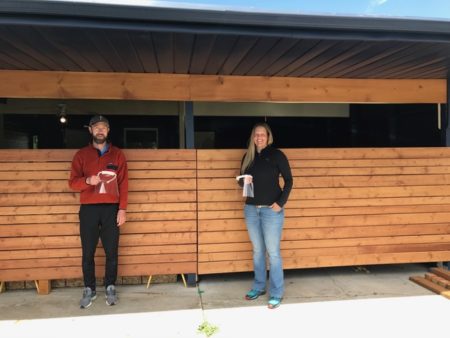 While student doctors at the Idaho College of Osteopathic Medicine (ICOM) aren’t yet able to fight COVID-19 on the front-line, they’re finding other ways to offer support.
While student doctors at the Idaho College of Osteopathic Medicine (ICOM) aren’t yet able to fight COVID-19 on the front-line, they’re finding other ways to offer support.
Partnering with Brian Wiley, an Assistant Professor of Graphic Design at Boise State University, a group of ICOM students are helping to create hundreds of face shields for local health care professionals and first responders. Using a CNC machine and some basic supplies, the group has produced 400 face masks so far — 120 in a single day alone — with an ultimate goal of 500.
“We have requests for over 400 face shields from seven fire departments in Idaho and several county Emergency Management Services,” said Krista Niezwaag, a second-year medical student at ICOM. “We’ve also received requests from a critical access hospital in the area, Interfaith Sanctuary, and medical providers at Yellowstone National Park. We’re providing 50 face shields in order to assist every organization who has requested some.”
Using open-sourced designs for face shields, Student Doctor Niezwaag and Professor Wiley adapted and enhanced the designs to create a safer — and still cost-effective — face shield.
“We wanted to have a better option for first responders who are in extremely close contact with patients,” Student Doctor Niezwaag said. “Our eighth prototype was the winner.”
Professor Wiley, who teaches design entrepreneurship and community-based partnerships at BSU, uses a CNC machine with help from his students to produce the parts needed for the face shields. They sanitize them and pass them off to ICOM students and their families, who then handle assembly and distribution.
“To some degree I felt an obligation to help being a state employee with somewhat of a background in rapid prototyping and manufacturing,” Professor Wiley said. “What I lacked though was any sort of medical expertise or understanding of the situations that these shields would be used in. That’s why it made sense to partner with Krista and ICOM.”
When used in combination with lower-grade surgical masks, face shields can provide the CDC-recommended level of protection for health care workers and first responders exposed to COVID-19.
“When Brian approached me with his vision to help with the PPE shortage, it was the perfect opportunity to get involved and blend two areas of study that seem so disparate,” Student Doctor Niezwaag said. “Our ability to bounce ideas back and forth and his amazing design skills made this an impactful and successful project. With students at ICOM and BSU wanting to find a way to help, we had many enthusiastic volunteers.